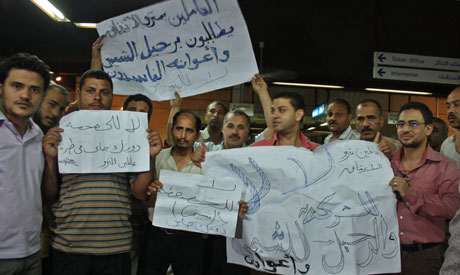
The sit-in of Metro's workers in June 2011 to sack the company's ex-head (Photo: Mai Shaheen)
Around 300 workers on Cairo’s metro began protests on Tuesday to demand the resignation of the operating company's chairman and his assistants.
Refaat Arfaat, head of metro workers’ syndicate, told Ahram Online that sit-ins were taking place at Shubra and Demerdash stations and would move to Al-Shohadaa station on Tuesday.
“It’s not about financial demands. We are talking about the maintenance of the metro which has become like an elderly women due to government negligence,” Arfaat said.
He said the metro’s workshops lack spare parts which cause trains to breakdown on a frequent basis.
Al-Ahram Arabic news website has said the workers will shut most metro stations on Wednesday and stop daily train services.
However, Arfaat denied this and said train services would not be disrupted.
A source at the metro company who preferred anonymity said the protesting workers had asked for better financial conditions and when the company chairman Ali Hussein refused they called for his resignation.
“It’s the usual thing we see from workers since the revolution,” the source added.
According to the source, the metro company has 7000 workers on minimum wages ranging from LE1000 to LE2000.
Ali Hussein met with a workers’ delegation on Monday and promised them a LE1000 bonus, the distribution of profit shares in February and to provide health insurance.
“He tries to bribe us with these offers,” Arfaat retorted.
In August, Al-Shorouk newspaper reported that the Egypt Co. for Metro Management and Operations had achieved a 40 per cent rise in its annual revenues in 2011/12 to an estimated at LE536.3 million ($88 million).
“I do not believe these numbers, the financial results of the metro company are not made public,” the anonymous source told Ahram Online.
Short link: